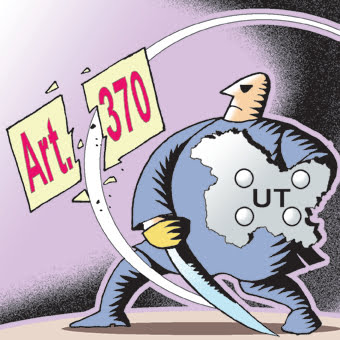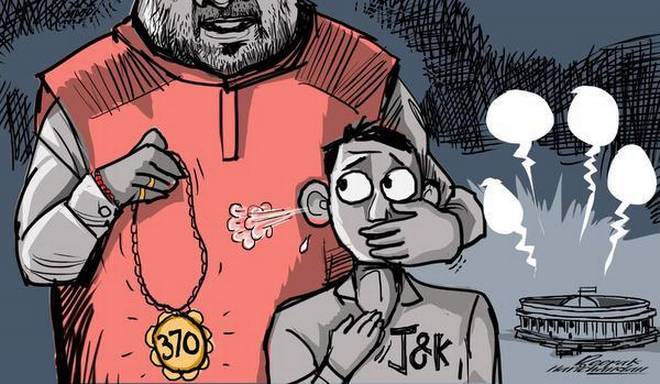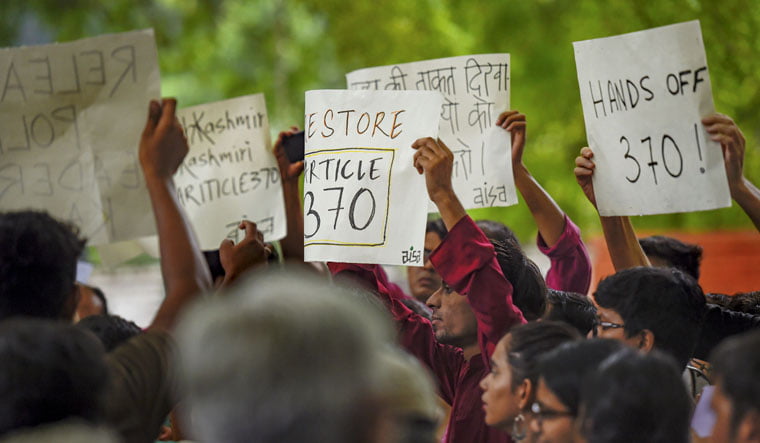The Union Home Minister, Amit Shah, announced in the Rajya Sabha on Monday that the special status granted under Article 370 has been revoked through a Presidential order. According to clause 3 of the article, the President is empowered to declare the article inoperative anytime by seeking due recommendation of the constituent assembly in Jammu and Kashmir. However, the constituent assembly has ceased to exist in the state since 1957 and there is no legislative assembly since the imposition of President’s rule in 2018. In such a situation, the government sought concurrence with the governor and defended the order on the grounds that the current government had only followed what was done under Nehru government in 1952 and 1962 when a similar route was taken.
Since the special status of J&K has been abrogated, it follows that the article 35A has also ceased to exist. The government’s move has been supported by parties like BSP, BJD, AIADMK, AAP, with Congress, JD(U), TMC, and others opposing the government’s decision. The repeal of the special status of J&K was preceded by heavy deployment of military troops in the region, leaving the local population alarmed as a security advisory was issued by J&K government for the Amarnath Yatra tourists to head back home amid speculations of terror threats. On Monday midnight, curfew prevailed in the state as section 144 was imposed prohibiting any movement of public and educational institutions were ordered to be closed.
The claims of the government for a prospective future of J&K, as it scraps the special status, are not guaranteed. But what is guaranteed is that Kashmiri sentiments have been betrayed, a constitutional pact has been dishonoured, and a state has been bifurcated into two union territories without a popular consensus.
The BJP government bypassed the amendment route by using the article 370 for stripping J&K of its special status. But it went one step ahead by introducing the Jammu and Kashmir Reorganization Bill that was passed by Rajya Sabha on Monday. Unlike what everyone imagined that the state of J&K would become an ordinary state of the country and would fully integrate with the nation, the Bill will bifurcate the state into two Union Territories: Jammu & Kashmir with a legislature, and Ladakh with no legislative body.
Amit Shah in his statement said that the state of Jammu and Kashmir would be revived when there would be an appropriate time and a “normal” situation in the state. Thus, a temporary provision has been used to replace the previous provision by the government that makes tall claims of ushering of the much-awaited development in the state, in the absence of the consent of the very people who are supposed to benefit from it.
What is Article 370?
Article 370 is a constitutional provision that accords a special status to the state of J&K. Introduced under the Part XXI of the Constitution, the article permits a separate Constitution for the state and limits the legislature’s powers to the domains of defence, finance and communications, and external affairs.
The article was included in the Constitution on 17 October, 1949. Nehru directed Sheikh Abdullah to consult the then Law Minister, B.R. Ambedkar, to draft the article. Later, it was Gopalaswami Ayyangar, a Member of the Drafting Committee of the Constitution and a Union Minister, who drafted the article in Part XXI, under Temporary and Transitional Provisions. Ayyangar reasoned that Kashmir was not ready for integration because of the “abnormal” and “unnatural” conditions in the area, post-infiltration in 1947. Thus, the article was inserted in the hope that J&K would become a part of the Indian Union, once real peace was attained and the state itself acquiesced to such an arrangement.
The provision has been challenged in the past for the special status that it grants to J&K. Some argue that the repeal of the Act is necessary for full integration of the state in India. Political parties like BJP have constantly supported the repeal of Article 370 to push forward their demand for Uniform Civil Code, a uniform set of laws that will regulate all the citizens of the country thus, doing away with the special status granted to J&K under the Constitution.
What is Article 35A?
Article 35A is a provision that grants J&K the prerogative of deciding the “permanent residents” of the state and also confers upon its local population special rights and privileges in public sector jobs and scholarships, acquiring property in the state and being eligible for state grants. The provision was included in the Constitution through a special Presidential order in 1954 and was issued under Article 370 (1) (d) of the Constitution which empowers the President to make certain “exceptions and modifications” to the Constitution for the benefit of ‘state subjects’ of J&K
The provision’s legality has been time and again questioned for its lack of parliamentary sanction. It has also been criticized for denying a permanent resident status to those women who marry non-Kashmiris, who do not hold a permanent resident certificate, thus, being discriminatory in nature. The provision also discourages private investment in the state.
What does Scrapping of Special Status of J&K Mean?

It is to be noted that the article 370 has not been done away with completely. Instead, the provisions that grant special status to J&K have been done away with, meaning that article 35A has also ceased to operate. In the past there had been numerous debates on the status of section 370 being temporary or permanent. While the BJP government has upheld that the provision is temporary, the Supreme Court of India ruled out in 2018 that the article has acquired permanent existence through years of existence, thus, making the abrogation impossible by President’s order in the absence of a constituent assembly that ceased to exist in the state since 1957.
With the special status under Article 370 abrogated, J&K would cease to have its own constitution and flag, all the provisions of the constitution would hereafter apply to the state. As per Article 35A, the preferential rights of the residents of J&K have been done away with, meaning that any non-Kashmiri can now acquire property in the state. This also brings good news for Kashmiri women who can now marry non-Kashmiris as they and their children would now be given the right to inheritance. The reservation laws will now be applicable to the state and the Rajya Sabha has already passed the Jammu and Kashmir Reservation (Second Amendment) Bill which provides 10 per cent reservation for the economically weaker sections in the state.
Thus, a temporary provision has been used to replace the previous provision by the government that makes tall claims of ushering of the much-awaited development in the state, in the absence of the consent of the very people who are supposed to benefit from it.
On the other hand, the use of Article 370 to scrap the special status through a President’s order raises serious concerns over the drastic change that the state had to undergo under a President’s rule. Such a step puts the federal system at stake, and also raises concerns over the validity of special provisions granted to other states. Federalism has a basis in the autonomy of states.
With autonomy being seized from the people of J&K, the government’s aim at strengthening the country by Kashmir’s integration is highly questionable. It is likely that the radical elements in the state would only be strengthened by such a move. So, the promises of development by the government seem hollow in a state that no longer exists, and its people who were not a party to the whole deliberation process.
Attack on the right to self-determination of Kashmiris

The entire turn of events with Amit Shah at the helm of the Rajya Sabha, serenading on the tunes of making the state of J&K the most developed one by the end of five years, shows the display of sheer insensitivity of the government towards Kashmiri sentiments. The Indian state has failed those Kashmiris, who belonged to the pro-India faction and placed their faith in the constitution of the country, which they believed would uphold the special status of J&K.
Also read: Book Excerpt: Blood, Censored – When Kashmiris Become The ‘Enemy’
The cost-benefit analysis of scrapping the special status of J&K is being done without admitting the voices of the people who will be directly affected by it. The local population has been locked down and cheated upon by calling the deployment of troops for security reasons when the government only wanted to curb the right to dissent of Kashmiris and reduce it to a mere law and order situation.
A serious clampdown on the democratic machinery began the minute the local population was pushed behind the doors as the Home Minister rushed to the Rajya Sabha to pass the Reorganization Bill. J&K did not only lose the special status, it also lost the status of a state. It is ironic how the Home Minister himself echoed the Vajpayee slogan, “Insaniyat, Jamhuriyat, Kashmiriyat,” when he presented the Jammu and Kashmir Reservation Bill in Rajya Sabha in July. The three principles of Insaniyat (humanism), Jamhuriyat (democracy) and Kashmiriyat (Kashmir’s legacy of amity) stand violated in the face of the government’s decision to fast-track the complex situation of Kashmir by simply reducing it to a matter of providing a level-playing field for all. What is repugnant is that the decision overrides the morality and constitutionality that the Indian state has always upheld and, is an inhumane approach to Kashmiri sentiments.
These developments have been celebrated by some groups who viewed Article 370 and Article 35A as the root cause for the under-developed state of Kashmiri economy. They have welcomed the Presidential order in the hope of improved infrastructure and employment opportunities in the state. But what becomes important to ask at this juncture is whether there was a democratic way of dissolving the special status of the state of J&K, without betraying the sentiments of the people in the state. It is also pertinent to ask whether the so-called promised developments would be fulfilled in a state, when the rest of the country is still grappling with a serious lack of employment opportunities.
Also read: Why Are We Ignoring The Growing Case Of Rapes In Kashmir?
The claims of the government for a prospective future of J&K, as it scraps the special status, are not guaranteed. But what is guaranteed is that Kashmiri sentiments have been betrayed, a constitutional pact has been dishonoured, and a state has been bifurcated into two union territories without a popular consensus. Added to this, is the brutal murder of the right of every Kashmiri to dissent against the break-up of their own state as the government imposed Section 144 all over the state. The Indian democracy is in its darkest hour, as an entire state breaks away with its very people watching their right to self-determination slip away from their hands.
Featured Image Source: Hindu
About the author(s)
Shubhra is a 20-year old political science grad who constantly questions politics, culture, life, and can be found having an existential crisis quite often.




Much needed article!
Thanks!